

If you’ve watched your teeth fall out one by one over the years, or if you’ve had a traumatic accident that caused you to lose them all at once, you might feel like your days of smiling with confidence are far in the past. However, that isn’t the case—dentures can help you get a completely new smile incredibly easily!
If you’re near San Marcos, CA, Nelson Y. Howard DDS and his incredible dental team can use this prosthetic to replace all of your missing teeth. Make an appointment with us today and we’ll let you know what dentures could do for you!


Nearly anyone with one or more missing teeth can be an excellent candidate for dentures. The first step toward enjoying your newly restored smile is to schedule a consultation at one of our offices in San Marcos or San Diego so Dr. Howard can evaluate your mouth and determine the best course of treatment for you. If he finds that you are not a good candidate yet, you may be able to become one later after having treatments to resolve issues like gum disease or reinforce your jawbone.
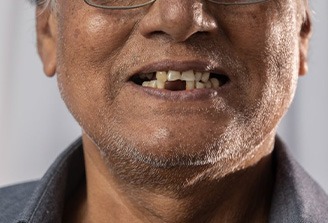
Tooth decay and gum disease are two of the most widespread health problems on Earth, and they, along with oral injuries, are the most common causes of tooth loss. Missing teeth can lead to a range of oral and overall health issues such as:

Dentures may be a great option if you have experienced extensive tooth loss, live with severe dental sensitivity, or have a lot of tooth decay as long as you have sufficiently healthy jawbones and gum tissue. Once you receive dentures, you will also need to commit to an excellent oral hygiene regimen to prevent infections and help your appliance fit well for as long as possible.
The right type of denture for you ultimately depends on how many teeth you’re missing. While a partial denture can replace one or a few teeth throughout the mouth, a full denture can restore a whole arch. If you’re looking for an appliance that offers a superior hold and maximum chewing power, implant dentures may be the appropriate solution. Since dentures are often more affordable than other tooth replacement methods, they may be an excellent choice for a patient on a budget.
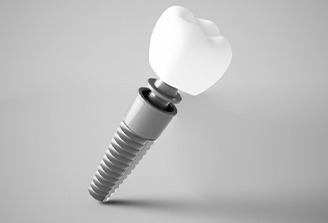
While dentures can be an amazing way to replace lost teeth, some patients may be better suited by other tooth-replacement methods such as:
Dental bridges: These appliances consist of one or a few artificial teeth strung between two dental crowns, and they can replace a single tooth or several sequential missing teeth. However, placing a bridge requires the alteration of the healthy teeth on either side of the gap so they can support its dental crowns.
Dental implants: These prosthetic appliances are considered the ideal form of tooth replacement because they look and feel like real teeth and can last for thirty years or a lifetime with excellent care. To receive a dental implant, a patient will need to have enough jawbone mass to host the titanium post that anchors it in place.

There are several types of dentures, and the one that you should use comes down to the particulars of your situation. We’ll give you a detailed recommendation when we meet, but here’s what you should know beforehand.

Partial dentures are ideal for those patients who are missing most, but not all, of their teeth on a gum ridge. They consist of false teeth on a metal base, and include small clips that allow them to attach to the natural teeth for support.

Full dentures, on the other hand, are meant for patients who are missing all of their teeth. They have nothing to attach to with clasps, which means that they are meticulously designed to adhere to the gums entirely via suction.
Full dentures consist of an acrylic base with either acrylic or porcelain teeth attached to it.

Implant dentures are an excellent option for patients who want the coverage of dentures but would like a little bit more stability. This can be done by attaching a full or partial denture to a series of metal posts surgically inserted into the jaw.
Implant dentures provide patients with not only greater bite strength, but superior durability as well. This means that if you go this route, you’re likely to save a lot of money on relines and replacements in the long run.
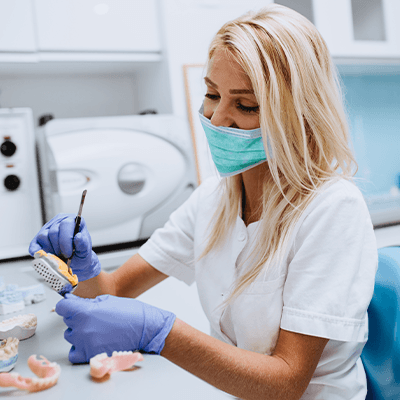
Before you get dentures, you may want to learn how they’re made. It’s a common thought – many folks like knowing what went into their replacement teeth. Fortunately, our office can gladly explain the ins and outs of the denture creation process to you. You’d then feel more confident in your treatment, rightly trusting that your restored smile is well-crafted. Just keep reading to learn the relevant details, or call our office for a chat!
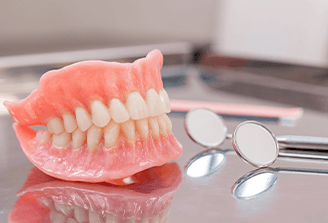
Whether a denture is partial or full, it always has two crucial parts: a base and artificial teeth. These things make up most of the overall device, so you should keep them in mind. Consider them more fully below:
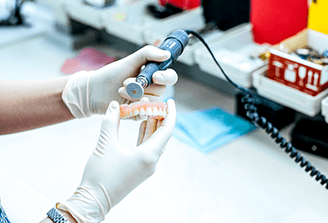
Each denture is custom-made for its patient, so making one involves a multi-step process. These key steps include:

Your mouth may feel sore as you adjust to your dentures. That’s a normal response; you’ll need time to get used to your new teeth and learn how they work. Once you’ve practiced a bit, the dentures will feel more familiar.
All that said, certain tips and tricks can speed up the adjustment. One good method would be to exercise your facial muscles, ensuring they’ll handle dentures better. Other approaches include eating soft foods (to avoid gum irritation) and using special adhesives (to enhance denture security). With these and similar actions, your dentures will soon feel more natural.
Should your denture pain worsen or persist, please call our office. We’ll gladly alter your devices so they don’t make your mouth ache.

Believe it or not, dentures do far more than replace missing teeth. They can restore confidence, improve daily function, and even protect your health. At Nelson Y. Howard, D.D.S., we provide custom-made dentures designed for comfort, durability, and natural aesthetics. From improving speech to enhancing nutrition, these prosthetics can dramatically transform your quality of life. Read more below to see how dentures can help you live, work, and feel your best every day.

The effects of missing teeth go deeper than appearance. They can also affect mental health in ways many people who are unfamiliar with tooth loss may not understand.
Studies, like the one published recently in BMC Public Health, found that people without teeth are often more socially withdrawn, and have linked tooth loss to increased anxiety and depression.
Dentures restore more than just your teeth—they restore confidence and self-esteem. At our San Marcos dental office, we’ve seen firsthand how regaining a full smile helps patients reconnect with loved ones, laugh out loud, and enjoy life without anxiety.

Missing teeth often cause speech difficulties like whistling, slurring, or mumbling. This can make conversations frustrating and cause reluctance to engage in social settings.
Dentures provide the support your lips and tongue need for proper pronunciation, leading to clearer speech. With well-fitted dentures from Dr. Howard, you’ll notice a big difference in how you can communicate. Everyday conversations with friends, family, and co-workers become smoother, more enjoyable, and more natural.

Chewing is the first step in healthy digestion, and without enough teeth, enjoying a balanced diet can be difficult. Dentures allow you to eat a wider variety of foods, from crunchy fruits to protein-rich meats, improving your overall nutrition.
Better chewing also helps break down food properly, which supports gut health and nutrient absorption. This is just another reason why our San Marcos team recommends these excellent, affordable prosthetics.

Tooth loss isn’t a single event—it's a multi-stage process that begins when a tooth is lost and accelerates with time and severity. One of the most devastating effects is bone loss in your jaw due to lack of stimulation. This can shrink your facial structure over time, leaving you looking much older than you are.
Dentures help reduce the impact of this process over time and can help prevent any natural teeth you have left from shifting out of place. Properly fitted dentures are also easy to remove and clean, making it simple to keep your mouth healthy.

A confident smile can open doors both socially and professionally. Research shows that people who smile often are more likely to be hired and viewed positively by others. Dentures can restore your ability to smile without hesitation, giving you an edge in job interviews, meetings, or even casual conversations.
At Nelson Y. Howard, D.D.S., we’ve helped countless San Marcos patients discover new opportunities simply by regaining a confident, natural-looking smile they’re proud to share. If you’re ready to join them, call our office and schedule a consultation!

Dentures can restore the beauty and function of your smile after tooth loss and may last for many years if you take excellent care of them. Luckily, caring for dentures is quite simple. Even if you have replaced all your teeth with restorations from our San Marcos office, it’s still important to visit us regularly for routine checkups so we can monitor your oral health, address issues in their early stages, and recommend better hygiene practices if necessary. Here’s a quick overview of a few excellent ways to keep your removable or all-on-4 implant dentures in excellent condition.

Remove and thoroughly rinse your dentures after each meal to flush away lingering food debris and plaque that can cause destructive oral infections. Never use hot water since it can warp your dentures and ruin their fit.
You’ll need to remove your dentures for a thorough cleaning at least once a day using a soft-bristled brush. Regular toothpaste can leave scratches in your restoration, so use a small amount of unscented hand soap, mild dish soap, or an approved denture cleanser instead. When not wearing or cleaning your dentures, be sure to store them in a container of lukewarm water or denture-soaking solution to keep them from drying out and losing their shape. Always rinse your dentures before wearing them again to keep the mouth from being exposed to harsh cleaning chemicals.
When you remove your dentures for cleaning, fill your sink with lukewarm water and cover your countertop with folded towels to create a cushion in case you drop your appliance. It’s also important to store your restorations in a secure place where children and pets cannot reach them.
Wearing your dentures continuously for days deprives your gums and jawbones of the rest they need to stay healthy and strong, so you’ll need to go without your restorations for at least eight hours daily. Most people remove their dentures before bed so their mouths can clean themselves overnight. When not wearing it, make sure to store your appliance in a container with water or an approved soaking solution to keep it from drying out and warping.
Pay attention to the look and feel of your dentures and bring any changes to our attention. Be on the lookout for oral health issues such as soft tissue sores, gum irritation, and signs of infection such as swelling, bleeding, or a foul taste as well as problems with their fit such as shifting and clicking. Never attempt to repair a broken denture on your own since this can damage the appliance further or lead to injuries. Instead, contact our office to schedule an appointment so we can determine if your device should be repaired or replaced.
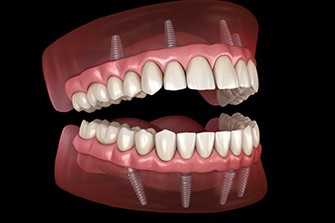
All-on-4 dentures can be a fantastic way to enjoy a strong and stable smile after tooth loss. While you can clean your artificial teeth by brushing twice and flossing once daily, stay away from toothpaste with stain-fighting agents like baking soda or charcoal. Products like floss threaders and water flossers can make cleaning between the teeth easier, and sulcus brushes can help you clean underneath your appliance. It’s also important to rinse with antibacterial mouthwash daily to fight tartar and kill harmful oral bacteria.